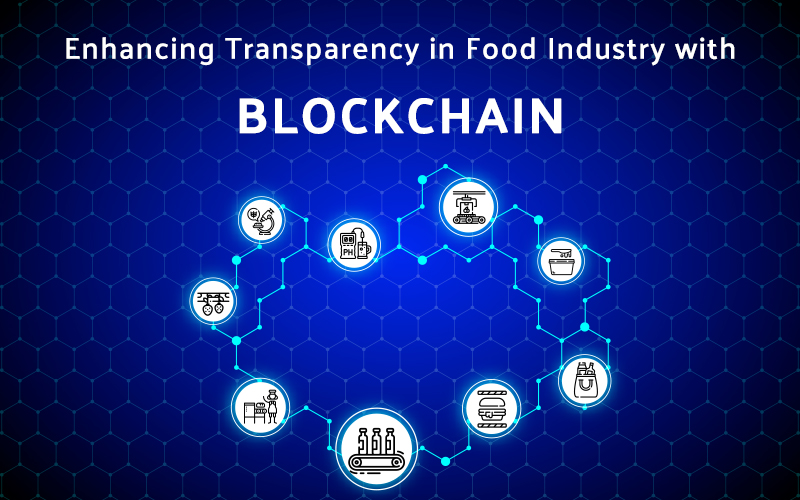The food and restaurant industry involves many intermediaries for handling and distributing the products and services to their consumers. It results in dealing with several challenges in the way, starting from food security, shortage, health concerns, and many others. Blockchain technology can prove to be highly advantageous with an open-source digital tracking system for streamlining the entire food supply chain.
The shared digital database of blockchain app development services can increase the levels of transparency as each participant can see the changes in it. It’s a speedy and accurate way of monitoring the food supply chains as managers can easily check and confirm daily shipments. Blockchain has several applications in the food industry that can affect almost every part of the business, like food sourcing, reviews, and promotions.
Essential Ways in Which Blockchain Impacts Food Sector
Blockchain can efficiently track the harvested product, farms from where it came from, the transit areas, set temperatures, and even trace a bad product batch. It can present unique opportunities for the restaurant industry in terms of finances, customer experiences, and supply chain sourcing. Here are some ways where the restaurant and the food industry can consider implementing Blockchain:
Supply Management
Storing supply management information on the Blockchain makes it tamper-resistant. It can save corporations billions of dollars every year in the transportation of goods due to an inefficient supply chain system. The food industry can use such solutions for improving the production and transportation of products by storing supply chain data. They can use RFID (Radio-frequency identification) chips in every stop of the supply chain and benefit from their private Blockchain.
It allows them to track and authenticate their shipments every step of the way and brings down the overall transportation cost. Notifications could then be sent to those restaurants that received the tainted products, which could then potentially save a restaurant’s reputation.
Food Authenticity
Blockchain can become a highly accessible and immutable design for providing consumers with concrete, immutable data about their food. Producers can utilize systems like enhanced water testing sensor mechanisms for increasing buffer zones between leafy green growers and livestock operations. These sensors, along with water and pesticide precision delivery systems, can connect to form a Blockchain network for gathering data and employing it.
It can also offer a way for farmers to get an opportunity to interact with customers and disseminate more information regarding how and why they grow food the way they do. Blockchain enables farmers to get data to consumers with proper context and help consumers make informed decisions about their food. Some other services include information about the growing condition of crops, factory conditions, batch numbers, expiration dates, storage, and shipping data. It enables end-users to identify how products traveled and provide them a sense of authenticity and accountability in the system.
Payment Systems
Restaurants often face problems while dealing with cash directly to digital forms of payment due to the high transfer cost paid by the owners of restaurants. By contrast, all payments made via the Blockchain are irreversible, and therefore there is no need for any of the customer support. All of these things make it cheaper to transact with Blockchain with benefits like feeless transactions using new data structures.
The benefits to restaurant owners can be immense as they have to wait for lesser time for bank settlements, and there are no fee payments. Blockchain can speed up the payment process by assisting farmers by guaranteeing more value and better selling chances directly to the consumers. It can transform the agriculture and food industry by reducing transaction fees and intermediaries by preventing price coercion too.
Reviews and Promotions
Restaurants are in direct contact with the end consumer, and therefore have a better idea of what they want. Hence, they also want to validate their claims by ensuring their suppliers do so as well and the ingredients used are safe, without disclosing the procedures and recipes. Here, the Blockchain with a smart self-executing contract would place the order only when the suppliers disclose their ingredients privately to the restaurant. The Blockchain would verify these ingredients and validate them all along, maintaining the privacy for recipes.
It lets consumers to independently verify items, food origins, and whether the restaurant is living up to its claims. Additionally, Blockchain can also reduce false and misleading restaurant reviews that pose a problem for both restaurants and customers. It can store such reviews without any alteration, that can bring more authenticity and ease to know which comments are honest or fabricated.
Wrapping Up
Blockchain technology can help address all these issues with proper tracking and monitoring to sustain a friendly environment between farmers, suppliers, producers, manufacturers, and owners. It can massively increase the traceability and transparency across the world food supply chains and become a new benchmark. As the retailers and suppliers look forward to implementing the forces of Blockchain technology, WeCode emerges as a leading Blockchain app development company that adopts this idea as the most tenable in the food industry. We have the required experience, expertise, and capability to handle many transactions simultaneously by making it advanced enough to handle a massive amount of generated data.


